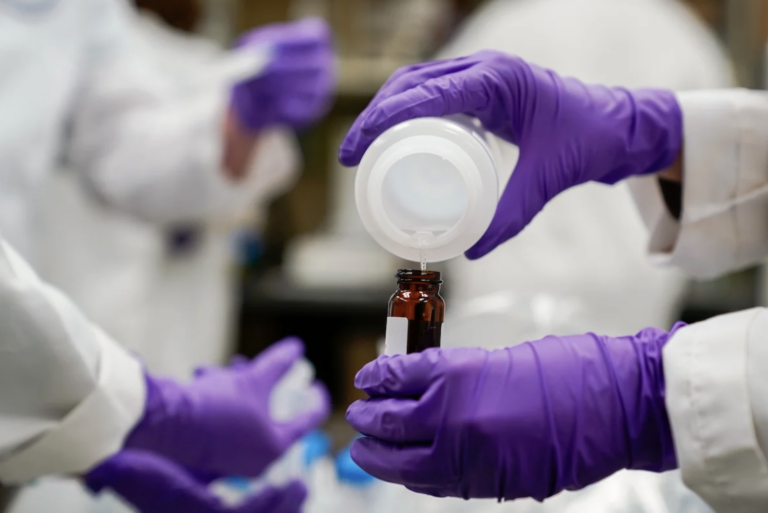Delaware lawmakers approve regulations for toxic PFAS chemicals
Regulations demanding Delaware water providers test for PFAS would take effect a year before federal requirements.
Listen 1:14
A water researcher pours a water sample into a smaller glass container for experimentation as part of drinking water and PFAS research at the U.S. Environmental Protection Agency Center for Environmental Solutions and Emergency Response, Thursday, Feb. 16, 2023. (AP Photo/Joshua A. Bickel)
This story is part of the WHYY News Climate Desk, bringing you news and solutions for our changing region.
From the Poconos to the Jersey Shore to the mouth of the Delaware Bay, what do you want to know about climate change? What would you like us to cover? Get in touch.
Delaware lawmakers unanimously passed legislation Monday that aims to reduce toxic PFAS chemicals in public drinking water.
Senate Bill 72 would require water providers in the state to begin testing for PFAS next year, and reduce the so-called “forever chemicals” to almost zero by 2029.
Environmentalists are applauding the legislation, which takes effect prior to federal regulations imposed by the U.S. Environmental Protection Agency.
“Every day that goes by that people are exposed to PFAS in their drinking water is another day that raises their risk of developing a health problem such as cancer,” said Tracy Carluccio, deputy director of the Delaware Riverkeeper Network. “So, it is very important that Delaware move ahead in an expeditious way to enact this legislation.”
PFAS, widely used in consumer products such as nonstick cookware and waterproof clothing, as well as in firefighting foam, have been linked to serious health problems, including some cancers, thyroid disease, developmental delays in children and other health conditions.
The health risks associated with PFAS, which can stay in the human bloodstream for years, have sparked numerous lawsuits against chemical manufacturers, such as DuPont and 3M.
Environmentalists say restricting PFAS in Delaware’s drinking water is crucial to ensure residents’ health is protected.
The state is no stranger to PFAS contamination. Its largest city, Wilmington, is known as the chemical capital of the world and is home to DuPont, which used PFAS chemicals to manufacture its products, such as Teflon.
PFAS chemicals have been detected across the state, including in the cities of Dover and Blades, as well as in rivers and streams.
The new regulations come as the Trump administration threatens to weaken federal PFAS regulations. The EPA implemented regulations last year requiring water providers to test and treat “forever chemicals” to almost zero by 2029. The agency pivoted last month, proposing to roll back certain PFAS restrictions and extend the compliance deadline to 2031.
Delaware’s new PFAS rules mirror the EPA’s regulations adopted last year, restricting two types of PFAS — PFOA and PFOS — to 4 parts per trillion.
Drinking water providers would also be required to reduce three other types of PFAS — PFHxS, PFNA and GenX — to 10 parts per trillion, and limit a mixture of several types of “forever chemicals.” The EPA has proposed rescinding federal restrictions on these types of chemicals in drinking water.
Though PFOA and PFOS are most commonly detected across the U.S., chemicals such as PFHxS are frequently found in communities near airports and military bases, where firefighting foam has been discharged.
Residents who live near the Wilmington Airport in New Castle have exceedingly high levels of PFHxS in their blood from drinking contaminated water, according to the Centers for Disease Control and Prevention. The contamination is associated with the National Guard’s use of firefighting foam on a base at the airport.
“DuPont being such an important industry in Delaware, and the use of PFAS at various facilities, including firefighting foam at military facilities, has really exposed Delawareans to higher levels of PFAS than many other states,” Carluccio said.
The new regulations require Delaware water providers to test for PFAS next year — a year sooner than the federal requirements. Water providers also would be required to notify rate payers if their drinking water contains PFAS.
“Forever chemicals are linked to serious health problems, particularly for children,” said the bill’s sponsor, state Sen. Darius Brown, in a statement. “Through Senate Bill 72, we underscore our continued commitment to transparency and empowering every Delawarean with the data necessary to make fully informed decisions about their personal health.”
The cost of treating PFAS
Smaller drinking water providers say they’re concerned about the costs associated with PFAS legislation. Treatment systems that remove “forever chemicals” cost millions of dollars.
Schools and small communities that operate on-site water systems are also required to meet state and federal regulations. There are at least 100 small neighborhoods, including mobile home communities, that operate their own water systems in rural parts of Delaware alone, said Heather Warren, executive director of the Delaware Rural Water Association.
“It might be a homeowner group that’s trying to deal with these regs, it may be a daycare provider who certainly the first thing is not, ‘How am I going to deal with PFAS?’ The first [priority] is the safety and health of the children in their care,’” she said. “It can also be schools, same thing, these are educators, not necessarily folks that know a whole lot about drinking water. So there will be a lot of bridging educational gaps about what PFAS is, why it’s harmful and how you treat it.”
The federal government recently allocated $9.8 million to fund PFAS treatment in small Delaware communities. However, Warren said she’s worried federal funding will stall out. The Trump administration has proposed cutting the EPA’s budget, and it’s not clear how this might impact water treatment initiatives in the future.
“We’re glad that the regulation is finally complete, and now drinking water systems have a goal to achieve,” she said. “We do know it’s going to be very costly for especially small water systems, mobile home communities, small municipalities that don’t have a great tax base to install treatment to bring it down to the levels it’s supposed to be.”
Officials in Delaware say the state would use funds from a settlement with DuPont and other chemical companies totaling $50 million to help water providers reduce PFAS over the next decade.
The legislation now heads to Democratic Gov. Matt Meyer to sign into law.
This story was supported by a statehouse coverage grant from the Corporation for Public Broadcasting.

Get daily updates from WHYY News!
WHYY is your source for fact-based, in-depth journalism and information. As a nonprofit organization, we rely on financial support from readers like you. Please give today.







